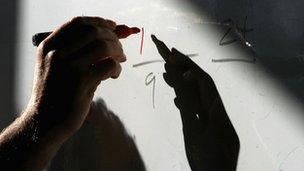Scotland may have answers to English maths problem
- Published

England should learn from the way maths is taught in Scotland
England should look north of the border for answers to the problem of poor maths skills, says a report.
A study by the Royal Society of Arts says England, where one in four adults cannot do basic calculations, is out-performed by the likes of Scotland and Hong Kong.
England's maths education is not fit for purpose and risks damaging the economy, it adds.
The government said England must keep up with leading education systems.
The RSA report cautions against adopting any country's teaching system wholesale but says that England should draw on the experiences of Scotland and Hong Kong to improve the effectiveness of its mathematics teaching.
Impact on science
"With nearly half of our students failing to achieve GCSE mathematics grade C or above, long term reform should be an urgent priority for ministers," said report author Emma Norris.
"The current system puts many students off maths for life. We need to find a new way to re-engage students," she added.
The RSA report also says some students' numeracy skills are so limited that universities are having to minimise the maths content of some science courses including medicine and psychology.
Last August a report on mathematics in England for the Conservative Party recommended that all students should study maths until the age of 18.
The report, by television presenter Carol Vorderman said the current system was failing young people.
Currently only 15% of students in England continue maths after GCSEs.
Scotland does better, with a quarter of post-16 students studying maths, but in Hong Kong everyone studies maths until they leave school, either to go to university or to join the workforce.
Scottish solution?
The report praises the way maths is taught in Scotland, where students "are able to progress at their own speed" and can move between teaching streams more easily than in England.
The Vorderman report also recommended that instead of one single maths GCSE, pupils should study for two separate qualifications in lifestyle and academic mathematics.
The English government is piloting the idea but in Scotland a similar system is already running.
A spokesman for the Department for Education said: "Ministers have made clear their ambition that the vast majority of young people continue to study maths up to 18 within a decade.
"We are carrying out a root and branch review of the national curriculum to give schools greater freedom over maths teaching.
"And we are overhauling GCSEs and A-levels to make sure they are robust and in line with the toughest education systems in the world."
The RSA report also says England's GCSE exam system can lead to "teaching to the test" which limits the maths skills that pupils learn.
The authors suggest finding new ways of testing pupils maths skills, possibly replacing parts of the exam with lower-key classroom based tests for less able students.
In addition they caution against Vorderman's suggestion of offering new post-16 mathematics qualifications which they say could be confusing for pupils and employers.
- Published8 August 2011
- Published14 September 2011
- Published22 March 2011